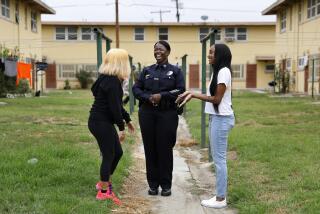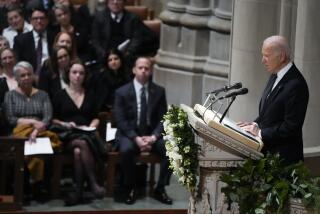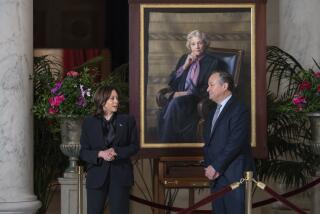Jeanne M. Holm dies at 88; first female Air Force general
Jeanne M. Holm, who played a pivotal role in opening up the military to women and who was the first female general in the Air Force and the first woman in any military branch to become a two-star general, has died. She was 88.
FOR THE RECORD:
Jeanne Holm obituary: The obituary in Monday’s LATExtra section on Jeanne M. Holm, the first female general in the Air Force, said Brig. Gen. Jean Klick was commander of the space systems division at Los Angeles Air Force Base. Klick was vice commander. —
Holm died of pneumonia Feb. 15 at a hospital in Annapolis, Md., said Wilma Vaught, president of the Women in Military Service for America Memorial Foundation. Holm lived in Edgewater, Md.
“She truly was a legend in our lifetime,” said Vaught, a retired Air Force one-star general. “Almost anything she touched, she made it better than it was.”
Throughout and after a military career that started with Holm driving trucks for the Women’s Army Auxiliary Corps during World War II, she worked to achieve parity for women in the military.
By 1965, Holm was director of Women in the Air Force, positioned to bring sweeping change to a military that largely viewed its female solders as a vast secretarial pool.
“It was a large challenge,” Holm, who kept the job until 1973, told Investor’s Business Daily last year. “Women were not allowed to create policy. I had to be creative.”
Her many groundbreaking accomplishments include successfully pushing for women to be admitted to service academies, serve as pilots and have expanded roles in combat.
Elevated to brigadier general in 1971, she received the second star of a major general two years later.
In the early 1970s, Holm also worked closely with future U.S. Supreme Court Justice Ruth Bader Ginsburg, then a lawyer for the American Civil Liberties Union, on a landmark legal case. The resulting U.S. Supreme Court ruling forced the military to give women the same benefits it gave men.
“She was a strategic thinker, particularly when it came to the politics of getting something done,” Vaught said. “She made you want to say yes.”
Jeanne Marjorie Holm was born June 23, 1921, in Portland, Ore., and grew up the middle of three children of a widow.
After graduating from high school, Holm worked as a silversmith. When World War II broke out, she was frustrated that she couldn’t follow her brothers into the military.
But after the Women’s Army Auxiliary Corps was organized in 1942, she joined and soon had an officer’s commission. Holm spent most of the war years commanding Army basic training units.
At Portland’s Lewis & Clark College, she studied art but was recalled to active duty with the Army in 1948 and transferred to the Air Force a year later after it was opened up to women.
Stationed in Germany, she became a personnel officer and helped with war plans during the Berlin Airlift.
Upon returning to the U.S. in 1952, Holm was the first woman to attend Alabama’s Air Command and Staff College at Maxwell Air Force Base in Alabama. She also earned a bachelor’s degree at Lewis & Clark in the late 1950s.
From 1957 to 1961, Holm was assigned to NATO in southern Italy, where she lived in a 2,000-year-old cave and learned to sail, the Christian Science Monitor reported in 1984.
She spent much of her later military career at the Pentagon and wrote two books on women in the military.
After retiring from active duty in 1975, she advised three presidents -- Gerald Ford, Jimmy Carter and Ronald Reagan -- on women’s issues.
“We wouldn’t have women in the Air Force without Jeanne Holm,” Brig. Gen. Jean Klick told the Oregonian newspaper in 1990 when she was commander of the space systems division at the Los Angeles Air Force Base.
“She came up at a critical time, when there was a big move in the Air Force . . . to do away with women altogether,” Klick said. “She was the one person who was smart enough, shrewd enough and persuasive enough to handle that job.”
“It was,” Holm once said, “a constant process of trying to keep the Air Force honest.”
Her survivors include a brother.
More to Read
Start your day right
Sign up for Essential California for the L.A. Times biggest news, features and recommendations in your inbox six days a week.
You may occasionally receive promotional content from the Los Angeles Times.







